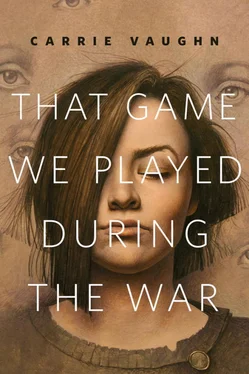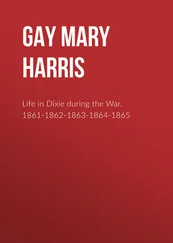Кэрри Вон - That Game We Played During the War
Здесь есть возможность читать онлайн «Кэрри Вон - That Game We Played During the War» весь текст электронной книги совершенно бесплатно (целиком полную версию без сокращений). В некоторых случаях можно слушать аудио, скачать через торрент в формате fb2 и присутствует краткое содержание. Город: New York, Год выпуска: 2016, ISBN: 2016, Издательство: Tor Books, Жанр: Фэнтези, short_story, на английском языке. Описание произведения, (предисловие) а так же отзывы посетителей доступны на портале библиотеки ЛибКат.
- Название:That Game We Played During the War
- Автор:
- Издательство:Tor Books
- Жанр:
- Год:2016
- Город:New York
- ISBN:978-0-765-38935-0
- Рейтинг книги:3 / 5. Голосов: 1
-
Избранное:Добавить в избранное
- Отзывы:
-
Ваша оценка:
- 60
- 1
- 2
- 3
- 4
- 5
That Game We Played During the War: краткое содержание, описание и аннотация
Предлагаем к чтению аннотацию, описание, краткое содержание или предисловие (зависит от того, что написал сам автор книги «That Game We Played During the War»). Если вы не нашли необходимую информацию о книге — напишите в комментариях, мы постараемся отыскать её.
That Game We Played During the War — читать онлайн бесплатно полную книгу (весь текст) целиком
Ниже представлен текст книги, разбитый по страницам. Система сохранения места последней прочитанной страницы, позволяет с удобством читать онлайн бесплатно книгу «That Game We Played During the War», без необходимости каждый раз заново искать на чём Вы остановились. Поставьте закладку, и сможете в любой момент перейти на страницу, на которой закончили чтение.
Интервал:
Закладка:
The Gaantish never asked each other how they were doing. She’d learned that back in the ward, looking after Valk. During his brief lucid moments she’d ask him how he was feeling, and he’d stare at her like she was playing a joke on him.
The emotion of affection was plain to those who could see it—everyone in a Gaantish uniform. And she was, under all that week’s pain and discomfort and unhappiness and uncertainty, almost happy to see him. She was the kind of nurse who had a favorite patient, even in a prison hospital.
He couldn’t not see her, not with every Gaantish soldier staring at her, then looking at him to see his reaction. She couldn’t hide her astonishment; she didn’t want to and didn’t try. She did realize this likely made the meeting harder for him than it did for her—whatever he thought of her, his staff would all see it. She didn’t know what he thought of her.
He merely nodded and waved the group on to continue processing, and they were washed down, given lumpy brown jumpsuits and assigned quarters. Later, she suspected he’d been the one to arrange the deal that won the rest of her unit’s freedom.
Calla had always thought it strange that people asked if prisoners were treated “well.” “Were you treated well?” No, she thought. The doors were locked. The guards all had guns. Did it matter if they had food and blankets, a roof? The food was strange, the blankets leftover from what the army used. Instead she answered, “We were not treated badly.”They were treated appropriately. War necessitated prisoners, since the alternative was slaughtering everyone on both sides, which both sides agreed was not ideal. You treated prisoners appropriately so that your own people would be treated appropriately in turn. That meant different things.
She was treated appropriately, which made it odd the day, only a week or so into her captivity, that Valk had her brought to his office alone. It wasn’t so odd that the guards hesitated or looked at either of them strangely. But she had been afraid. Helpless, afraid, everything. They left the binders around her wrists. All she could do was stand there before his desk and wonder if he was the kind of man who enjoyed hurting his prisoners, who enjoyed minds in pain. She wouldn’t have thought so, but she’d only ever known him when he was asleep and the brief waking moments when he seemed so lost and confused she couldn’t help but pity him, so what did she know?
“I won’t hurt you,” he said, after a long moment when he simply watched her, and she tried to hide her shaking. “You can believe me.” He asked her to sit. She remained standing, as he must have known she would.
“You were one of the nurses at the hospital. I remember you.”
“Not many remember their stays there.”
“I remember you. You were kind.”
She couldn’t not be. It was why she’d become a nurse. She didn’t have to say anything.
“You were playing a game. I remember—two people. A board. You enjoyed it very much. You had the most interesting thoughts.”
She didn’t have to think long to remember. Those afternoon games with Elio had been a good time. “Chess. It was chess.”
“Can you teach me to play?”
“Sir, I’d lose every single time. I’m not sure you’d enjoy the game. Not much challenge.”
“Nevertheless, I would like to learn it.”
This presented a dilemma. Could it be interpreted as cooperating with the enemy? More than she already was? He couldn’t force her. On the other hand, was this an opportunity? But for what? She was a medic, not a spy. Not that Enith even had spies. Valk gave her plenty of time to think this over, waiting patiently, not revealing if her mental arguments and counterarguments amused or irritated him.
“I don’t have a board or pieces.”
“What would you need to make them?”
She told him she would have to think about it, which would have been hilarious if she hadn’t been so tired and confused. The guards took her back to her cell, where she talked to the ranking Enithi officer prisoner about it. “Might not be a bad thing to have a friend here,” he advised.
“But he’ll know I’m faking it!” she answered.
“So?” he’d said, and he was right. Calla was what she was and it wouldn’t do any good to think differently. She asked for a square of cardboard and a black marker and did up a board, and drew rudimentary pieces on other little squares of cardboard. She’d rather have cut them out but didn’t bother asking for scissors, and no one offered, so that was that. It was the ugliest chess set that had ever existed.
Valk learned very quickly because she already knew the rules and all she had to do was think them and he learned. The strategy of it was rather more difficult to teach. He’d get this screwed-up look of concentration, and she might have understood a little bit of what attracted him to the game: There was a lot to think about, and Valk liked the challenge of so much thought coming out of one person. And yes, he always knew what moves she was planning. Which was when she started playing at random. If she could surprise herself, she could surprise him. Then she agreed to the deal to get her people released, she worked in their hospital, they played chess, and she got sick.
She could not learn to marshal her thoughts and emotions the way these people learned to as children. She tried, as a matter of survival, and only managed to stop feeling anything at all.
The diagnosis was depression—Gaant’s mental health people were very good. She, who had been so generally high-spirited for most of her life, had had no idea what was happening or how to cope and had grown very ill indeed, until it wasn’t that she didn’t want to play chess against Valk. She couldn’t. She couldn’t keep her mind on the game, couldn’t recognize the pieces by looking at them, couldn’t even think of how they moved. One day, walking in a haze between one ward and another at the hospital, she sank to the floor and stayed there. Valk was summoned. He held her hand and tried to see into her, to see what was wrong.
She didn’t remember thinking anything at the time. Only seeing the image of her hand in his and not understanding it.
He arranged for her to be part of another prisoner swap, and she went home. Before the transfer he took her aside and spoke softly. “I forget that this is all opaque to you, that you don’t know most of what’s going on around you. So, since I didn’t say it before: Thank you.”
“For what?” she’d replied. He’d looked at her blankly, because he didn’t seem to know himself. Not enough to be able to explain it, and she couldn’t see.
Others came to watch the game—drawn, Calla presumed, by the tangle of thoughts she and Valk were producing. He was getting frustrated. She was playing with the giddy abandon of the six-year-old she had been when her mother taught her the game. And now the whole room shared her fond memories, and the fact that her mother had died in one of the famines that wracked Enith when food production had been disrupted by the war. Ten years ago now. Everyone on both sides had stories like that. Let us share our stories, she thought.
“You won’t win, playing like that,” one of the observing doctors said. After half an hour of watching they probably all understood the rules completely and could play themselves. They’d have no idea how the game was really supposed to be played, however. She wasn’t playing properly at all, which was rather a lot of fun.
“No, but I may not lose,” she said.
“I’m still not sure what the point of this game is,” said a nurse, her confusion plain.
“This game, right now? The point is to annoy Major Larn,” Calla said. This got a chuckle from them—those who’d been looking after him knew him well. Valk, however, smiled at her. She had not spoken the truth, precisely. Everyone else was too polite to say anything.
Читать дальшеИнтервал:
Закладка:
Похожие книги на «That Game We Played During the War»
Представляем Вашему вниманию похожие книги на «That Game We Played During the War» списком для выбора. Мы отобрали схожую по названию и смыслу литературу в надежде предоставить читателям больше вариантов отыскать новые, интересные, ещё непрочитанные произведения.
Обсуждение, отзывы о книге «That Game We Played During the War» и просто собственные мнения читателей. Оставьте ваши комментарии, напишите, что Вы думаете о произведении, его смысле или главных героях. Укажите что конкретно понравилось, а что нет, и почему Вы так считаете.












